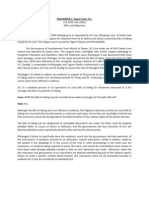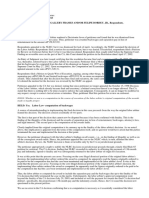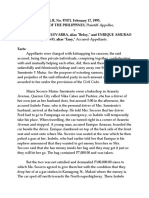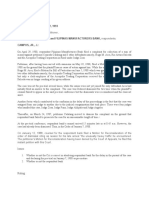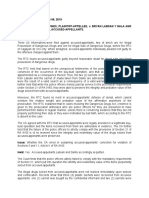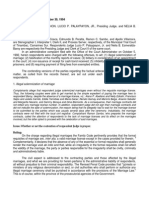0 ratings0% found this document useful (0 votes)
76 viewsCosca V Palaypayon
Cosca V Palaypayon
Uploaded by
Angelica1) Judge Palaypayon was charged with illegally solemnizing marriages without marriage licenses. The Family Code requires a valid marriage license except in certain cases.
2) Judge Palaypayon solemnized 6 marriages without licenses, leaving spaces blank on the marriage contracts and not signing them himself.
3) By solemnizing marriages without licenses, Judge Palaypayon failed to comply with formal marriage requirements and is administratively liable under the Family Code. The Supreme Court imposed a fine and warning on Judge Palaypayon and dismissed his clerk from service.
Copyright:
© All Rights Reserved
Available Formats
Download as DOCX, PDF, TXT or read online from Scribd
Cosca V Palaypayon
Cosca V Palaypayon
Uploaded by
Angelica0 ratings0% found this document useful (0 votes)
76 views1 page1) Judge Palaypayon was charged with illegally solemnizing marriages without marriage licenses. The Family Code requires a valid marriage license except in certain cases.
2) Judge Palaypayon solemnized 6 marriages without licenses, leaving spaces blank on the marriage contracts and not signing them himself.
3) By solemnizing marriages without licenses, Judge Palaypayon failed to comply with formal marriage requirements and is administratively liable under the Family Code. The Supreme Court imposed a fine and warning on Judge Palaypayon and dismissed his clerk from service.
Original Title
Cosca v Palaypayon.docx
Copyright
© © All Rights Reserved
Available Formats
DOCX, PDF, TXT or read online from Scribd
Share this document
Did you find this document useful?
Is this content inappropriate?
1) Judge Palaypayon was charged with illegally solemnizing marriages without marriage licenses. The Family Code requires a valid marriage license except in certain cases.
2) Judge Palaypayon solemnized 6 marriages without licenses, leaving spaces blank on the marriage contracts and not signing them himself.
3) By solemnizing marriages without licenses, Judge Palaypayon failed to comply with formal marriage requirements and is administratively liable under the Family Code. The Supreme Court imposed a fine and warning on Judge Palaypayon and dismissed his clerk from service.
Copyright:
© All Rights Reserved
Available Formats
Download as DOCX, PDF, TXT or read online from Scribd
Download as docx, pdf, or txt
0 ratings0% found this document useful (0 votes)
76 views1 pageCosca V Palaypayon
Cosca V Palaypayon
Uploaded by
Angelica1) Judge Palaypayon was charged with illegally solemnizing marriages without marriage licenses. The Family Code requires a valid marriage license except in certain cases.
2) Judge Palaypayon solemnized 6 marriages without licenses, leaving spaces blank on the marriage contracts and not signing them himself.
3) By solemnizing marriages without licenses, Judge Palaypayon failed to comply with formal marriage requirements and is administratively liable under the Family Code. The Supreme Court imposed a fine and warning on Judge Palaypayon and dismissed his clerk from service.
Copyright:
© All Rights Reserved
Available Formats
Download as DOCX, PDF, TXT or read online from Scribd
Download as docx, pdf, or txt
You are on page 1of 1
Cosca v.
Palaypayon ISSUE: WON Judge Palaypayon should be held liable under
AM MTJ-92-721 | Sept. 30, 1994 | Per Curiam Art. 4(3) of FC – YES.
a. On the charge regarding illegal marriages, the Family Code
PARTIES pertinently provides that the formal requisites of
Petitioners: Juvy Cosca, Edmundo Peralta, Ramon Sambo, and marriage are, inter alia, a valid marriage license except in
Apollo Villamora, Stenographer I, Interpreter I, Clerk II, and the cases provided for therein.
Process Server, respectively, of MTC Tinambac, Camarines Sur b. Complementarily, it declares that the absence of any of
Respondent: Judge Lucio Palaypayon, Jr. and Nelia Esmeralda- the essential or formal requisites shall generally render
Baroy are respectively the Presiding Judge and Clerk of Court II the marriage void ab initio and that, while an irregularity
of MTC Tinambac, Camarines Sur in the formal requisites shall not affect the validity of the
marriage, the party or parties responsible for the
FACTS irregularity shall be civilly, criminally and
1. Petitioners, in an administrative complaint filed with OCA, administratively liable.
charged respondents with the following offenses: (i) c. The civil aspect is addressed to the contracting parties and
illegal solemnization of marriage; (ii) falsification of those affected by the illegal marriages, and what we are
monthly reports of cases; (iii) bribery in consideration of providing for herein pertains to the administrative liability
an appointment in the court; (iv) non-issuance of receipt of respondents, all without prejudice to their criminal
for cash bond received; (v) infidelity in the custody of responsibility.
detained prisoners; and (vi) requiring payment of filing d. The Revised Penal Code provides that "(p)riests or
fees from exempted entities. ministers of any religious denomination or sect, or civil
2. On illegal solemnization of marriage, complainants alleged authorities who shall perform or authorize any illegal
that respondent judge solemnized marriages even marriage ceremony shall be punished in accordance with
without the requisite marriage license. the provisions of the Marriage Law." This is of course,
a. Couples were able to get married by simply paying the within the province of the prosecutorial agencies of the
marriage fees to respondent Baroy. Consequently, the Government.
marriage contracts did not reflect any marriage license
number. RULING: SC imposed a fine of P20,000 on respondent Judge
b. In addition, respondent judge did not sign the marriage Lucio Palaypayon, Jr. with stern warning that any repetition of
contracts and did not indicate the date of the same or similar offenses in the future will definitely be
solemnization, the reason being that he allegedly had severely dealth with. Respondent Nelia Esmeralda-Baroy is
to wait for the marriage license to be submitted by the DISMISSED from service, with forfeiture of all retirement
parties which was usually several days after the benefits and with prejudice to employment in any branch,
ceremony. agency, or instrumentality of the government, including GOCC.
3. The complaint was referred to RTC Naga City and based on
the report and recommendations of RTC Judge Gerona,
Judge Palaypayon had solemnized 6 marriages without a
marriage license.
4. In all those marriages, the black space in the marriage
contracts to show the number of the marriage was
solemnized, as required by Art. 22 of the Family Code
were not filled up.
5. While the contracting parties and their witnesses signed
their marriage contracts, Judge Palaypayon did not affix
his signature therein.
6. The contracting parties were also not furnished a copy of
their marriage contract and the Local Civil Registrar was
not sent either a copy of the marriage certificate, as
required by Art. 23 of the Family Code.
7. As such, by solemnizing alone a marriage without a
marriage license, he as the solemnizing officer is the one
responsible for the irregularity in not complying (with) the
formal requisites of marriage, and under Art. 4(3) of the
Family Code, he shall be civilly, criminally and
administratively liable.
You might also like
- Universiti Islam Madinah DocumentsDocument1 pageUniversiti Islam Madinah Documentsnur amnani syafinaz marzukiNo ratings yet
- Characteristics of AttitudeDocument7 pagesCharacteristics of Attitudevinayaksajan100% (1)
- The Character: OFA PerpetualiteDocument29 pagesThe Character: OFA PerpetualiteAltheya RoxasNo ratings yet
- PowerPoint PresentationsDocument41 pagesPowerPoint PresentationsPanis Ryan100% (6)
- 114020-2002-People v. NorrudinDocument14 pages114020-2002-People v. NorrudinMau AntallanNo ratings yet
- PHILAMGEN - Vda de Onate DigestDocument3 pagesPHILAMGEN - Vda de Onate Digestjudith_marie1012No ratings yet
- Tickler: Unenforceable Contracts, Statute of Frauds G.R. No. L-5447 March 1, 1910 PAUL REISS, ET AL., Plaintiffs-Plaintiffs, JOSE M. MEMIJE, Defendant-DefendantDocument1 pageTickler: Unenforceable Contracts, Statute of Frauds G.R. No. L-5447 March 1, 1910 PAUL REISS, ET AL., Plaintiffs-Plaintiffs, JOSE M. MEMIJE, Defendant-DefendantRM DGNo ratings yet
- Torts and Damages Case Digest Mar.3Document23 pagesTorts and Damages Case Digest Mar.3Van NessaNo ratings yet
- Probate of The Late William GibersonDocument2 pagesProbate of The Late William GibersonMarivic Asilo Zacarias-LozanoNo ratings yet
- de Gala v. de GalaDocument2 pagesde Gala v. de GalaevilminionsattackNo ratings yet
- Case DigestDocument8 pagesCase DigestMV FadsNo ratings yet
- Cruz vs. Court of Appeals, 192 SCRA 209, December 10, 1990Document10 pagesCruz vs. Court of Appeals, 192 SCRA 209, December 10, 1990georjalynjoyNo ratings yet
- Batch 5 Case 5&6Document3 pagesBatch 5 Case 5&6Maryjoy MelchorNo ratings yet
- People v. Duranan / GR No. 134074-75 / January 16, 2001Document1 pagePeople v. Duranan / GR No. 134074-75 / January 16, 2001Mini U. SorianoNo ratings yet
- 1 - Castillo Vs BuencilloDocument3 pages1 - Castillo Vs BuencillobusinessmanNo ratings yet
- People vs. Quidato Jr.Document1 pagePeople vs. Quidato Jr.Tootsie GuzmaNo ratings yet
- Feria v. CA, 325 SCRA 525 (2000)Document10 pagesFeria v. CA, 325 SCRA 525 (2000)GioNo ratings yet
- Case No. 4 PEOPLE OF THE PHILIPPINES v. ISABELO PUNO y GUEVARRADocument3 pagesCase No. 4 PEOPLE OF THE PHILIPPINES v. ISABELO PUNO y GUEVARRACarmel Grace KiwasNo ratings yet
- Rule 128 General ProvisionsDocument4 pagesRule 128 General ProvisionsPring SumNo ratings yet
- Galvez vs. CADocument8 pagesGalvez vs. CARuby Patricia MaronillaNo ratings yet
- Calalang Vs CADocument2 pagesCalalang Vs CAAnn Alejo-Dela TorreNo ratings yet
- Buenaventura V RamosDocument4 pagesBuenaventura V RamosMiguel CastricionesNo ratings yet
- People v. Franco, 269 SCRA 211 91997)Document6 pagesPeople v. Franco, 269 SCRA 211 91997)GioNo ratings yet
- Licaros vs. Gatmaitan G.R. No. 142838, August 9, 2001Document8 pagesLicaros vs. Gatmaitan G.R. No. 142838, August 9, 2001Fides DamascoNo ratings yet
- Bar Exam Suggested Answers in CriminalDocument26 pagesBar Exam Suggested Answers in CriminaljyoanuuNo ratings yet
- 20 Apolonia Banayad Frianela v. Servillano Banayad JRDocument2 pages20 Apolonia Banayad Frianela v. Servillano Banayad JRKim GuevarraNo ratings yet
- Antero Sison JR v. AnchetaDocument4 pagesAntero Sison JR v. AnchetaL.C.ChengNo ratings yet
- Rizal Labor Union Vs Rizal Cement Co. IncDocument2 pagesRizal Labor Union Vs Rizal Cement Co. IncMabelle ArellanoNo ratings yet
- People vs. LabsanDocument2 pagesPeople vs. LabsanRobNo ratings yet
- Republic v. Razon and Jai Alai CorporationDocument3 pagesRepublic v. Razon and Jai Alai CorporationYanz RamsNo ratings yet
- Siquion Reyna Montecillo and Ongsiako Law Office Vs Chinlo-SiaDocument16 pagesSiquion Reyna Montecillo and Ongsiako Law Office Vs Chinlo-Sia8111 aaa 1118No ratings yet
- Oropesa Vs OropesaDocument13 pagesOropesa Vs OropesaAU SLNo ratings yet
- 2tado PP Vs TipayDocument2 pages2tado PP Vs TipayReginaNo ratings yet
- GR 140895 P V BisdaDocument5 pagesGR 140895 P V BisdaJessie AncogNo ratings yet
- People Vs Mejares ValenciaDocument7 pagesPeople Vs Mejares ValenciaMarc Cedric CaabayNo ratings yet
- Case DigestsDocument9 pagesCase DigestsTubal ClemencioNo ratings yet
- G.R. NO. 191567, March 20, 2013Document2 pagesG.R. NO. 191567, March 20, 2013Lenneo SorianoNo ratings yet
- Fulgado v. CADocument2 pagesFulgado v. CAAnton FortichNo ratings yet
- Universal Motors vs. VelascoDocument2 pagesUniversal Motors vs. VelascoJayson Lloyd P. MaquilanNo ratings yet
- Evidence AkjhdjkashjkshjkasfhjksfgjkagfajkfjgfjhgfDocument12 pagesEvidence AkjhdjkashjkshjkasfhjksfgjkagfajkfjgfjhgfJeanny Anne CaparaNo ratings yet
- Case DigestsDocument2 pagesCase DigestsChristoffer Allan LiquiganNo ratings yet
- Case Digest Case No. 5 Case No. 6Document3 pagesCase Digest Case No. 5 Case No. 6carl fuerzasNo ratings yet
- PEOPLE V ALVARIODocument1 pagePEOPLE V ALVARIOaliahNo ratings yet
- Rule 19 GillianDocument2 pagesRule 19 GillianGillian Caye Geniza BrionesNo ratings yet
- Duero vs. Court of AppealsDocument1 pageDuero vs. Court of AppealsKenneth Ray TagleNo ratings yet
- Evidence Digest For Balitaan Vs CFI of BatangasDocument1 pageEvidence Digest For Balitaan Vs CFI of BatangasSui100% (1)
- Monge vs. PeopleDocument5 pagesMonge vs. PeopleAJ AslaronaNo ratings yet
- Case Name: Vestil v. IAC and Uy G.R. No. 74431 Date: November 6, 1989 By: Chua, Dane Larieze Topic: Strict LiabilityDocument2 pagesCase Name: Vestil v. IAC and Uy G.R. No. 74431 Date: November 6, 1989 By: Chua, Dane Larieze Topic: Strict Liability123abc456defNo ratings yet
- Avenido V CSCDocument1 pageAvenido V CSCDominic EstremosNo ratings yet
- A18. Tating V Marcella 519 SCRA 79Document1 pageA18. Tating V Marcella 519 SCRA 79Larry Fritz SignabonNo ratings yet
- Rodriguez V ArroyoDocument3 pagesRodriguez V ArroyoLucila MangrobangNo ratings yet
- V. 10. AnonuevoDocument2 pagesV. 10. AnonuevoJoshua Quentin TarceloNo ratings yet
- Original Development and Construction Corp Vs CA 202 Scra 753Document10 pagesOriginal Development and Construction Corp Vs CA 202 Scra 753albemartNo ratings yet
- Vda Dejacinto vs. Vda de JacintoDocument2 pagesVda Dejacinto vs. Vda de JacintoEdvangelineManaloRodriguezNo ratings yet
- Summaries of Writ of Amparo, Habeas Data, and KalikasanDocument15 pagesSummaries of Writ of Amparo, Habeas Data, and KalikasanPhillip Joshua GonzalesNo ratings yet
- Case Digest EvidDocument4 pagesCase Digest EvidJeng PionNo ratings yet
- CA AGRO-INDUSTRIAL DEVELOPMENT CORP. vs. THE HONORABLE COURT OF APPEALS and SECURITY BANK AND TRUST COMPANYDocument2 pagesCA AGRO-INDUSTRIAL DEVELOPMENT CORP. vs. THE HONORABLE COURT OF APPEALS and SECURITY BANK AND TRUST COMPANYCeth GarvezNo ratings yet
- SSS vs. CA Case DigestDocument1 pageSSS vs. CA Case Digestunbeatable38No ratings yet
- People vs. BolanosDocument2 pagesPeople vs. BolanosJason CruzNo ratings yet
- G.R. No. L-25704 April 24, 1968 ANGEL JOSE WAREHOUSING CO., INC., Plaintiff-Appellee, CHELDA ENTERPRISES and DAVID SYJUECO, Defendants-AppellantsDocument18 pagesG.R. No. L-25704 April 24, 1968 ANGEL JOSE WAREHOUSING CO., INC., Plaintiff-Appellee, CHELDA ENTERPRISES and DAVID SYJUECO, Defendants-AppellantsQhryszxianniech SaiburNo ratings yet
- G.R. No. 157766 July 12, 2007 ERNESTO L. SALAS, Petitioner, Sta. Mesa Market Corporation and The Heirs of Primitivo E. DOMINGO, RespondentsDocument2 pagesG.R. No. 157766 July 12, 2007 ERNESTO L. SALAS, Petitioner, Sta. Mesa Market Corporation and The Heirs of Primitivo E. DOMINGO, RespondentsAJ SantosNo ratings yet
- Cosca Vs PalaypayonDocument1 pageCosca Vs PalaypayonBryan-Charmaine ZamboNo ratings yet
- Cosca Vs PalaypayonDocument1 pageCosca Vs PalaypayonGracey PelagioNo ratings yet
- Distinctions Between Absent and Defective (3) Marriage Before A Judge Outside His Court)Document2 pagesDistinctions Between Absent and Defective (3) Marriage Before A Judge Outside His Court)QuiquiNo ratings yet
- VDS v. Insular LifeDocument2 pagesVDS v. Insular LifeAngelicaNo ratings yet
- (Digest) Dissenting Opinion of J. Caguioa in Alyansa para Sa Bagong Pilipinas, Inc. v. ERCDocument2 pages(Digest) Dissenting Opinion of J. Caguioa in Alyansa para Sa Bagong Pilipinas, Inc. v. ERCAngelicaNo ratings yet
- Tuatis V Sps EscolDocument2 pagesTuatis V Sps EscolAngelicaNo ratings yet
- Glan v. IACDocument2 pagesGlan v. IACAngelicaNo ratings yet
- City Warden v. EstrellaDocument2 pagesCity Warden v. EstrellaAngelicaNo ratings yet
- Datumanong v. MalagaDocument3 pagesDatumanong v. MalagaAngelicaNo ratings yet
- NG v. Asian CrusadersDocument1 pageNG v. Asian CrusadersAngelicaNo ratings yet
- JM Dominguez Agronomic Co In. v. LiclicanDocument2 pagesJM Dominguez Agronomic Co In. v. LiclicanAngelicaNo ratings yet
- Pacific Commercial V YatcoDocument1 pagePacific Commercial V YatcoAngelicaNo ratings yet
- Austria V CADocument2 pagesAustria V CAAngelicaNo ratings yet
- 02 David v. SETDocument5 pages02 David v. SETAngelicaNo ratings yet
- David V Agbay and PeopleDocument1 pageDavid V Agbay and PeopleAngelicaNo ratings yet
- Property - Province of Zamboanga v. City of ZamboangaDocument2 pagesProperty - Province of Zamboanga v. City of ZamboangaAngelica100% (1)
- Caedo v. Yu Khe ThaiDocument2 pagesCaedo v. Yu Khe ThaiAngelicaNo ratings yet
- On Fresh Period RuleDocument1 pageOn Fresh Period RuleAngelicaNo ratings yet
- Genato v. de LorenzoDocument2 pagesGenato v. de LorenzoAngelicaNo ratings yet
- JOUR328I SyllabusDocument18 pagesJOUR328I SyllabusDanielle OhlNo ratings yet
- Code of Ethics For Youth Ministry LeadersDocument2 pagesCode of Ethics For Youth Ministry Leadersapi-265038798No ratings yet
- Case On DisbarmentDocument3 pagesCase On DisbarmentFlorenz Ross MosqueraNo ratings yet
- Transpo Law Cases (FINALS)Document17 pagesTranspo Law Cases (FINALS)ShaneeeeyNo ratings yet
- Rational and Behavioral Decision MakingDocument23 pagesRational and Behavioral Decision Makingjaymangal_singh0% (1)
- Value Engineering (VE) in Design-Build: A Value Management ApproachDocument16 pagesValue Engineering (VE) in Design-Build: A Value Management ApproachTAHER AMMARNo ratings yet
- Rhibu GitaDocument9 pagesRhibu Gitabrett25No ratings yet
- Conessia Gipson Copy 2Document1 pageConessia Gipson Copy 2api-312383304No ratings yet
- Business Law ModuleDocument105 pagesBusiness Law ModuleAMANUEL MENGISTUNo ratings yet
- Jesse Garcia Vs Constable Michelle Barrientes Vela - 2018CI02593Document21 pagesJesse Garcia Vs Constable Michelle Barrientes Vela - 2018CI02593Dillon CollierNo ratings yet
- Guilatco v. City of DagupanDocument2 pagesGuilatco v. City of DagupanGretchen CanedoNo ratings yet
- User Manual - Auto Fill From PRNDocument7 pagesUser Manual - Auto Fill From PRNKeyur ThakkarNo ratings yet
- Mozambique LNG Action PlanDocument4 pagesMozambique LNG Action PlanBayano ValyNo ratings yet
- 11 Chapter 6Document38 pages11 Chapter 6Simon DevramNo ratings yet
- WPA EVALUATION (Marking)Document3 pagesWPA EVALUATION (Marking)Mohd RazifNo ratings yet
- Towards A Theory of The Axial Age: Explaining The Emergence of Religion-Cultural EntrepreneursDocument34 pagesTowards A Theory of The Axial Age: Explaining The Emergence of Religion-Cultural EntrepreneurseemaatacNo ratings yet
- CBMC1001 Operation Management (TQM) : Quality Management, Ethics, and Corporate Social ResponsibilityDocument4 pagesCBMC1001 Operation Management (TQM) : Quality Management, Ethics, and Corporate Social ResponsibilityElisea Judel SerranoNo ratings yet
- Persuasive Essay 1Document2 pagesPersuasive Essay 1canisaNo ratings yet
- Johnson and Blair - Informal Logic - An OverviewDocument15 pagesJohnson and Blair - Informal Logic - An Overviewbulk.mailing8284No ratings yet
- HeadSpace HR Corporate Presentation 2018-19Document16 pagesHeadSpace HR Corporate Presentation 2018-19Sudeep ChakrabortyNo ratings yet
- Dental Office Lease Contract (Model)Document2 pagesDental Office Lease Contract (Model)ScribdTranslationsNo ratings yet
- CA Unions Labor Case Summary GR 94716Document2 pagesCA Unions Labor Case Summary GR 94716George PandaNo ratings yet
- Event Sponsorship ContractDocument10 pagesEvent Sponsorship ContractNicholas StokesNo ratings yet
- Siliguri Taxation Bar Association: Administrative Office Liaison Office Liaison OfficeDocument18 pagesSiliguri Taxation Bar Association: Administrative Office Liaison Office Liaison OfficeRAHULCHOW1100% (1)
- Review Regulatory LawsDocument3 pagesReview Regulatory Lawsiloilocity0% (1)
- 4 Key Concepts DilemmaDocument37 pages4 Key Concepts Dilemmaaokijiadmiral19No ratings yet





